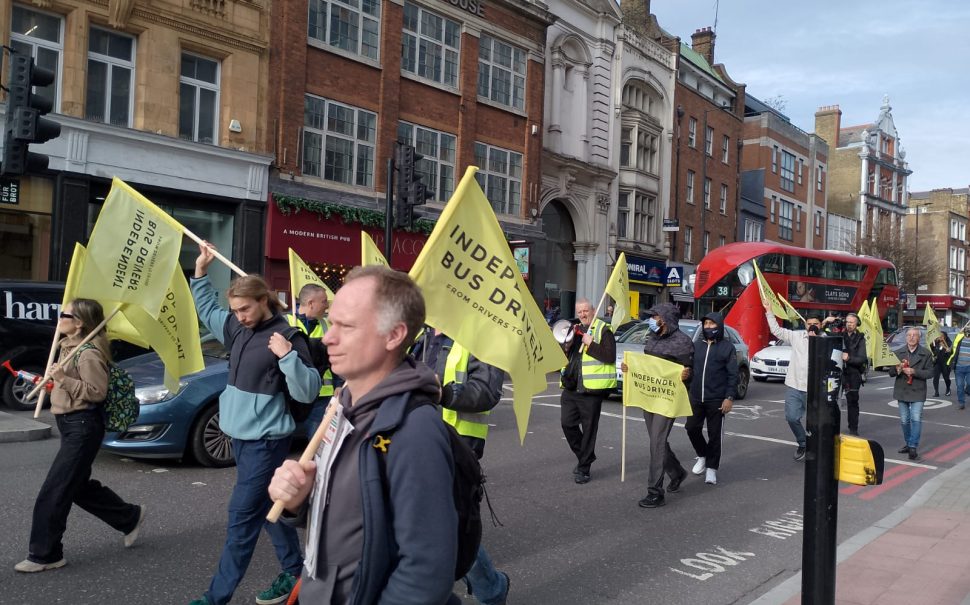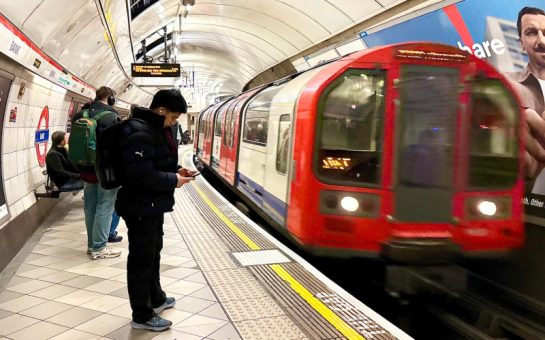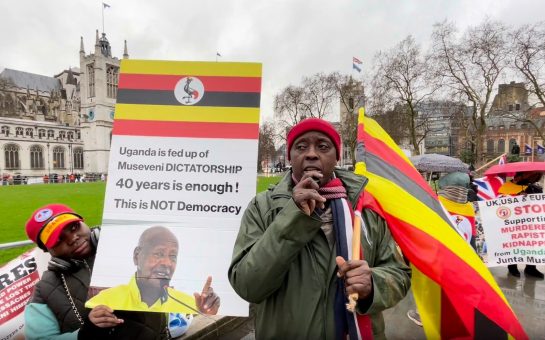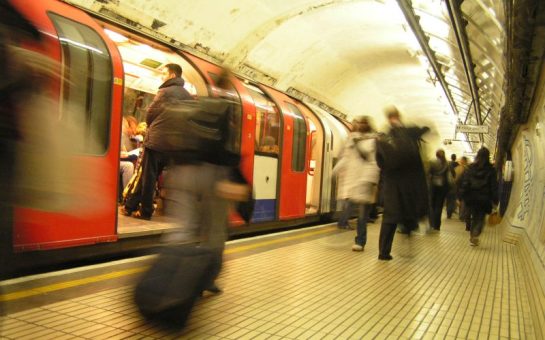Bus drivers marched 2.5 miles from Islington Green to Transport for London (TfL) headquarters on Wednesday to demand an end to ‘inhumane’ working conditions.
Drivers, their family members, safety campaigners, and politicians participated in the demonstration — which called for the ‘Bus Drivers’ Bill of Rights’ to be enshrined in the employment contracts of London’s bus operators.
The march, which concluded with speeches outside TfL’s Palestra House, was the third event coordinated by the Independent Bus Drivers campaigning group in the last year.
Dylan, a driver who helped organise the march and wished not to give his full name, said: “Sometimes we’re working eight or nine days in a row without having a day off. Our bodies are exhausted.
“We’re being forced to drive vehicles that aren’t in a fit condition for the road.
“When we’re not well and we’re signed off by a doctor, our companies harass us to come back to work.
“We don’t have regular access to toilets. We can drive for two hours and have nowhere to go.”
Members of the Independent Bus Drivers say their dispute with the operating companies, which directly employ them, and TfL, which contracts those companies, is longstanding, but that the last five years have seen a further deterioration in their treatment and workplace standards.
The Bill of Rights — which includes adequate rest breaks, toilet facilities on every route, protection for whistle-blowers, and an end to forced overtime among its 12 demands — is intended to arrest this trend.
Functioning air-conditioning and heating in drivers’ cabs also feature on the group’s list of demands.
It claims that many buses currently have neither, with temperatures in cabs dropping uncomfortably low during the winter and exceeding 40°C in the summer.
Dylan added: “I sometimes have to take a spare uniform into work during the summer because we don’t have working air-conditioning, and when I come off after the first half [of my shift], my top is drenched in sweat.
“It’s inhumane for this to be happening in this day and age. We’re only asking for basic human rights.”
An agreement between Unite the Union — London bus drivers’ only recognised union — TfL, and bus operators has established that routes with round trips of up to two-and-a-half hours must only have toilet facilities at one end.
Drivers say this isn’t sufficient, and that many TfL routes still fail to meet this requirement.
Speaking through a megaphone along the protest route, one driver spoke of frequently needing to enter pubs or shops and ask permission to use their toilets during shifts.
Lorraine Robertson, a former driver with 17 years of experience, explained that the absence of toilet facilities is particularly unpleasant for women, and that she knows female drivers who now take medication to prevent themselves needing to go to the bathroom during shifts.
She said: “One woman, who was in her fifties, kept getting caught short. She wanted to go to the toilet often and there wasn’t anywhere to go, so her doctor put her on tablets.
“Obviously females have periods,” she added. “They’re saying that we don’t need to use the toilet for 150 minutes, but some women have heavy periods and need to change themselves about once every half-hour.
“How can they justify saying we don’t need a toilet for 150 minutes? It’s rubbish.”
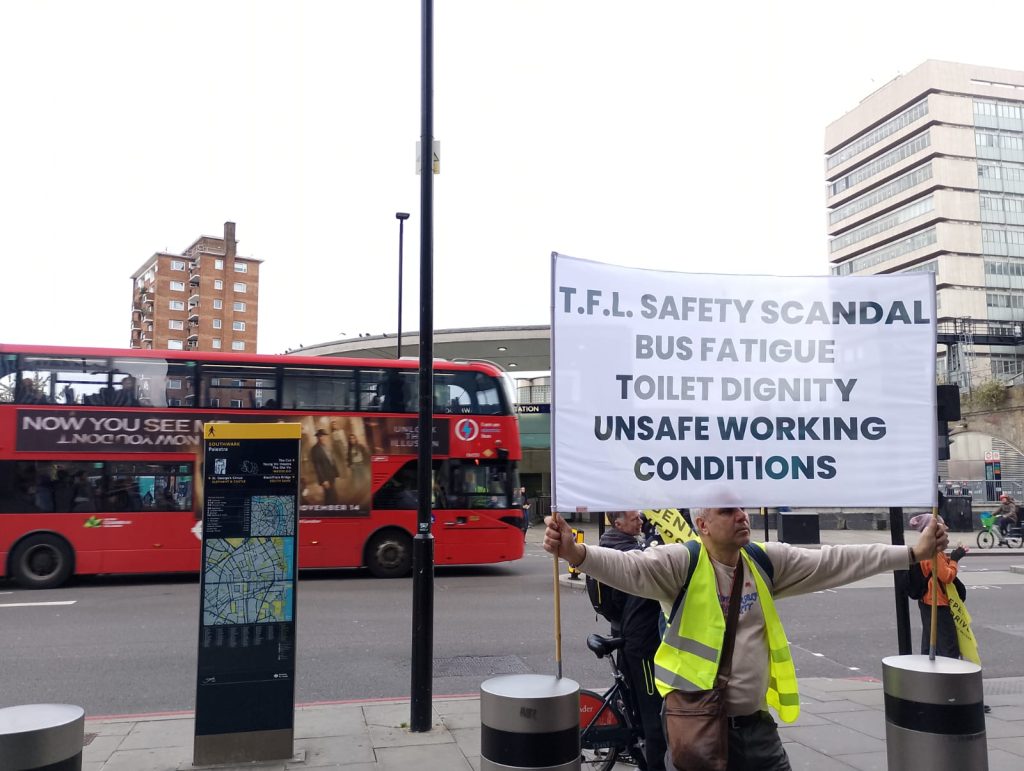
The South West Londoner has spoken to a number of drivers who wish to remain anonymous. All said they often feel pressured to drive unsafe buses, and described working conditions and shift patterns that leave them constantly fatigued.
One driver said: “Engineers will be told about a fault and say ‘Oh it’s just a light on the dashboard’.
“Things like doors that don’t work — everyone’s had that.
“But also blocked filters which can get hot and cause fires — and there have actually been fires recently — and issues with brakes get ignored too.
“The agreement is that, if the bus has no working retarder, it shouldn’t move — because obviously it’s a braking issue.
“But, countless times, this happens and you just have to carry on. If you don’t, they’ll just send another driver out in it.
“Then if something happens — if you have an accident — they say it’s your fault that you drove it when you shouldn’t have.
“This kind of thing happens day in, day out. You can ask any driver.”
On the topic of fatigue, another driver said: “You start work early, then you start late, and then you start early again.
“At some point, your body doesn’t know if it’s time for breakfast, for dinner, for lunch. That’s not healthy at all — and it’s very dangerous.
“Do they care? No — as long as they’re within the law of giving you 10 hours between shifts.
“They tell you to rest eight hours, but it’s impossible when you only have a 10-hour gap between duties.
“Do you sleep eight hours, do you have a social life, can you spend time with your wife and your kids? No.
“All drivers are suffering from fatigue, but to change that would mean employing more people — which is more expensive for the companies.
“Obviously, they don’t want that.”
A driver’s wife, who also wished to remain anonymous, explained that she was marching because of the toll she’s seen her husband’s work take on him and their family.
She said: “We have a son, but we don’t have a family life. My husband drives long hours and his shifts can change at the last minute, so we can never plan anything — it’s so frustrating.
“He’s stressed every day. And when he’s home, he doesn’t have energy.
“Being married to a bus driver hasn’t been easy.”
Figures from across the political spectrum have backed bus drivers in their campaign to achieve the terms set out in the Bill of Rights.
Lord Hampton, who recently sponsored five, ultimately unsuccessful, safety-related amendments to the Better Buses Bill in the House of Lords, told the South West Londoner that there should be no need to legislate for the drivers’ demands because they should already have them.
He said: “It’s all down to health and safety, and what you consider fair employment.
“I think they’re a well organised, cogent, intelligent group of people who obviously have these real issues. You should have the ability to go to the bathroom.
“Freedom from constant radio distractions — that’s health and safety. No harassment to work when seriously ill, protection of whistleblowers without retaliation — that’s employment rights.
“Only being sent out in safe, well maintained vehicles? If they’re not, that’s criminal.
“TfL will probably say ‘we don’t recognise this because nobody’s brought this to our attention’.
“But if it has been brought to their attention and they’re not doing anything about it, that’s a very different thing.”
Outside Palestra House, speeches in support of the drivers were given by London Assembly members Caroline Russell, of the Green Party, Reform UK’s Keith Prince, and the Conservative Party’s Neil Garratt.
Former TfL board member Michael Liebreich also spoke — telling the crowd they were on ‘the right side of history’ — after a series of speeches by drivers and campaigners.
Asked for comment, TfL Director of Buses Lorna Murphy said: “We are working together on a range of measures to further improve working conditions, health, and wellbeing.
“We would like to reassure colleagues that any reports from drivers are always fully investigated, and our operators should never take action against people raising concerns about welfare.
“We value all feedback and will carefully consider any proposals for improvements to safety and welfare.”
Murphy was invited to attend Wednesday’s demonstration but declined.
On the forecourt of its headquarters, campaigners did not agree that TfL supports whistleblowers.
Prince said: “When drivers have these grievances, they go to the unions, they go to the bus operators, and they’re just persecuted. They’re not taken seriously.
“They whistleblow, then they become victims. I recently talked to a bus driver who blew the whistle and ended up getting sacked.
“It’s absolutely outrageous what’s happening.”
The sense that drivers cannot safely speak out against their employers was echoed by former bus driver and event organiser Kevin Mustafa.
He said: “In the bus drivers’ contracts, there’s a whistleblower policy that says you should not speak to the press or discredit the company in any way.
“If a driver turns up today, is photographed, and that gets back to the garage manager, that could put them in a bad place.”
Mustafa explained that many drivers believed that, while their attendance at the march might not cause them to be fired, it could lead to them being singled out for unfair punishment later on.
He said: “There’s a culture of fear. That’s why people don’t speak up as much, and it’s potentially why some drivers don’t come along.
“But it’s a case of drivers being brave. Once the drivers are brave, we’ll move further forward.
“I would have liked to have seen more people today, but we’re still putting a message out there.
“TfL know we were here today — and they know we’re still fighting on.”
Feature image credit: Ajay Smith
